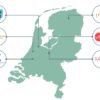News

The YOUth cohort study: MRI protocol and test-retest reliability in adults
YOUth facilitates data sharing and aims for reliable and high-quality data. This first publication by the YOUth MRI team includes an overview of the YOUth Child & Adolescent magnetic resonance imaging (MRI) protocol and test-retest reliability for different neuroimaging modalities. The researchers show that using the state-of-the art YOUth MRI protocol brain measures can be…
Read more
Neural and behavioral signatures of social evaluation and adaptation in childhood and adolescence: The Leiden consortium on individual development (L-CID)
The Consortium on Individual Development aims to unravel why some children thrive and others don’t. The Leiden Consortium on Individual Development (L-CID) contributes to answering this question by studying how social evaluations trigger self-protective and other-oriented processes and how children may differ in their susceptibility to these social evaluations. Self-control and prosociality Two processes…
Read more
Cohort profile: a detailed description of the YOUth cohort study
The YOUth cohort is one of the newly established cohorts within the Consortium on Individual Development, focussing specifically on children’s development of social competence and self-regulation. YOUth produces a wealth of high quality, safe and FAIR data, and makes these available for other researchers. In the CID special issue in Developmental Cognitive Neuroscience (DCN), YOUth’s…
Read more
FAIR, safe and high-quality data: The data infrastructure and accessibility of the YOUth cohort study
YOUth is a longitudinal cohort study in the Netherlands that aims to produce and safely store FAIR (Findable, Accessible, Interoperable and Reusable) and high-quality data. In this CID special issue article YOUth shares their experience and expertise in setting up a high-quality research data infrastructure for sensitive cohort data. Plus, also describe the procedures and…
Read more
The development of self-control during adolescence
by Mariëlle Zondervan-Zwijnenburg (Postdoc Utrecht University) In this paper, we evaluate how self-control develops and whether there is a gender effect on its development. We find robust support for a positive development in self-control over adolescence. Furthermore, we find mixed evidence with respect to the impact of gender. Parent-reports mainly support the hypothesis that girls…
Read more
Newly appointed assistant professor Roy Hessels
CID and I go back a long way. In early 2013, I started working in the group of Chantal Kemner on my dissertation, which I successfully defended cum laude in July 2017. Two topics featured prominently in my thesis, both of which are now wholly integrated in the YOUth cohort study. First, I validated eye trackers – used…
Read more
The influence of genes and environment on social brain and behaviour
Written by Mara van der Meulen (Postdoc L-CID) In the Consortium on Individual Development we aim to increase our understanding of why it’s easier for some children to find their way into society than it is for others. One of the means to achieve this is by investigating prosocial behaviour and empathy, two important contributors…
Read more
Limiting data loss in infant EEG
Written by Bauke van der Velde (PhD candidate Utrecht University) “Studying the features of data loss can help prevent biases in gathered data and increase our understanding of how to study infants more effectively in the future” RATIONALE Studying the infant brain with electroencephalography (EEG) can be difficult. It is impossible to tell an infant…
Read more
Newly appointed assistant professor Lara Wierenga
Currently finishing up final waves of data collection at the Leiden- Consortium on Individual development Lara Wierenga, assistant professor Leiden University, WP2 My main interest is to unravel why some individuals are more vulnerable to develop developmental disorders than others. My PhD project at University Medical Center Utrecht focused on typical and atypical brain development…
Read more
PDI-SSH funding for harmonized metadata infrastructure
Connecting Data in Child Development (CD2) is a new initiative to develop a digital infrastructure that encompasses harmonized metadata for six longitudinal youth cohorts. CD2 was one of twelve projects to receive funding from the Platform for Digital Infrastructure for Social Sciences and Humanities (PDI-SSH). Six longitudinal youth cohorts (YOUth, L-CID, RADAR, NTR, TRAILS, and Generation…
Read more